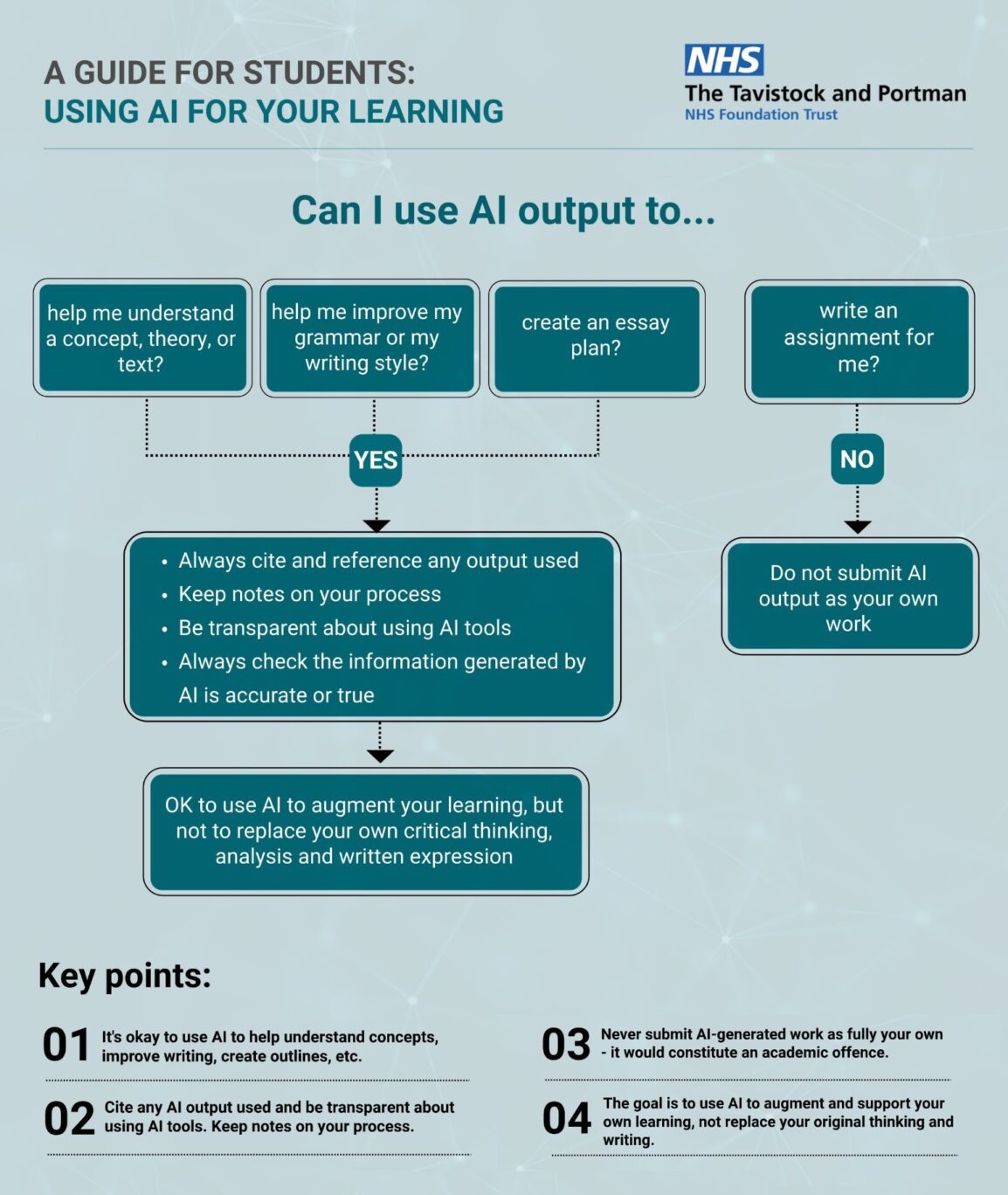Using AI in education
What is artificial intelligence?
Artificial Intelligence (AI) is a term used to describe machine-implemented abilities to reason, plan, solve problems, think abstractly, comprehend complex ideas, learn quickly, or learn from experience.
What is generative AI?
Generative AI is a type of AI that creates new content or data. Recent developments mean that Generative AI is very easy to access and use without specialist training, for example through applications such as ChatGPT, Gemini, Claude and Copilot. For example, ChatGPT could be asked to explain how a combustion engine works and it will return a well-written coherent written answer.
What is the Tavistock and Portman’s position on students’ use of AI?
We want you to explore Generative AI tools responsibly and use them appropriately. When you use these tools, remember to think about things like keeping your data safe, respecting copyrights, and being honest in your academic work. We want you to develop the knowledge and skills to be able to use AI effectively and ethically to support your learning and help you succeed in the future.
What are the limitations of AI?
Text-based responses that generative AI produces are well-written and can appear convincing. However, generative AI learns from historic internet-based material which can be out of date or unreliable. Sometimes this means generative AI presents information that is not correct.
Other known limitations of generative AI are that it can create fictitious citations, make up facts, express biased views, and give weak responses about nuanced, contextual, or contemporary matters for which there is often little or no accurate web-based information for it to draw upon.
These errors are often difficult to spot and therefore never assume that the content created by generative AI is accurate, up to date or true, unless you know it to be so or have verified it through another reliable source.
How can I use AI to help with my learning?
It is important to realise that AI’s most useful application is to augment rather than replace human intellectual and creative thinking.
There are many appropriate ways in which you can use AI to help you study and learn. We encourage you to use AI tools to develop an understanding of its strengths and limitations, and the skills to use AI ethically and effectively. Here are a few examples of how AI could be used to help with your learning:
- Creating an essay plan to help you develop and improve the structure of your assignment.
- Using AI to help you improve your grammar or your writing style by looking at how it constructs answers to questions.
- Asking AI to explain a concept, theory, or text that you have had trouble understanding.
Never assume the information generated by AI is accurate or true. Check it.
Why can’t I use AI to write my assessments?
It is important you do not use AI to generate assessed work and submit it as if it were your own work. All the assessed work you submit for your course must be your own.
Writing your own assignments is the only way in which you will develop the skill of communicating effectively in written form. It is also a key pathway for developing your skills more broadly, including the key abilities of developing, formulating, expressing, and testing your own ideas. You will be cheating yourself if you don’t develop those skills by writing your own assignments – whether with or without assistance from digital tools including AI.
What things can I do to make sure I use AI appropriately?
- Never present AI-generated work as your own in an assignment.
- Always cite and reference material included in your assignments that is not your own work.
- Never ask AI to generate experimental data which you then submit having purported to have collected it yourself as primary data, either in raw form or after analysis. This is fabrication and counts as serious misconduct.
- When you are preparing an assignment, it is a good idea to keep notes that you make along the way and try to keep different versions saved as separate files as your work develops. Should you be suspected of committing an academic offence you will be able to use such notes and archived files to demonstrate how you have constructed the assignment.
- Be transparent about which tools you use and how you have used them to create your academic work.

University of Essex courses
The Trust follows the University of Essex procedures regarding academic offences for students on courses that are validated by the University of Essex. If you attempt to pass off AI-generated material as your own work, you will be committing an academic offence.
Under 1.2c of the current Academic Offences Procedures, the following would constitute an academic offence:
“…false authorship or contract cheating, including the soliciting of a third party or the use of artificial intelligence, machine learning or other automated technology, to produce material that is then submitted for assessment and presented as one’s own original work.”
Read the full University of Essex Academic Offences Procedure.